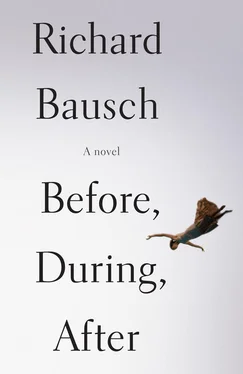She wanted another drink and remembered signaling the bartender. Looking into the bar, she saw the disorder there and decided not to go back in.
On the veranda, seated in one of the wicker chairs looking out toward the lowering red-daubed horizon, another woman sat quite still, with a handkerchief held tight in her fist. The backs of her hands looked bruised. There was nowhere to go — nowhere to escape these others and herself. She wanted sleep but feared being alone. The only empty chair was to this woman’s right. The woman sniffled and opened the hand holding the handkerchief and commenced folding and unfolding the cloth. On the other side of her was Ratzi. He glanced over at Natasha, held up one hand, and moved the fingers in an almost-sheepish little halfhearted wave. Beyond Ratzi, a young man was kneeling in front of a young woman, arms around her middle, making soothing sounds. But the young woman seemed to be laughing.
Mrs. Ratzibungen walked out and stood speaking to Ratzi in German, not quite whispering, casting quick looks at the woman folding and unfolding the handkerchief. Then she stepped over to Natasha.
“You vent to Kingston,” she said. “ Ja? Mit Ratzi.”
Natasha nodded, though the other didn’t quite wait for a response, tilting her head slightly in the direction of the woman with the handkerchief. “This is Mr. Skinner’s vife.”
“Oh.” Natasha started to offer her hand but then decided against it. Nothing in Mrs. Skinner’s manner revealed any kind of tolerance for gestures.
She only glanced Natasha’s way, sniffled, and then said, “Do you know where my husband is?”
“He was looking for you,” Natasha told her. “Earlier. I mean this morning. He was with my friend Constance. You haven’t seen him since this morning?”
The woman’s expression was incredulous. “He has a drinking problem.”
Natasha kept still. Mrs. Ratzibungen shook her head and looked out toward the beach.
“And a heart problem,” Mrs. Skinner continued. “And liver trouble.”
“I’m sorry.”
“And psoriasis.”
Natasha was silent.
“And asthma.”
“Oh.”
“And kidney and prostate trouble.”
“Really.”
“You don’t believe me?”
“Yes.”
Mrs. Ratzibungen moved off, saying something about having other guests who were scheduled to arrive and who were either stranded somewhere on the way or, worse, had canceled their plans altogether.
“He had a stroke last year,” Mrs. Skinner continued, sniffling. “He’s in terrible shape. Well, you saw him. The doctors have told him over and over.”
“I don’t know where anyone is,” Natasha said. “My fiancé—”
The other cut her off. “What kind of person is your friend.”
“Excuse me?”
“Is your friend a moral person.” Mrs. Skinner’s tone was devoid of the slightest hint of a question. “I’m asking you. Is your friend a moral person.”
“Well — she’s my friend. And of course — of course, a nice person.”
Mrs. Skinner clutched the handkerchief tight in her fist again and, looking at Natasha with an expression very close to rage, said “What?” as if the younger woman had said something so preposterous that it caused offense.
Natasha gathered herself. “I said she’s a nice person. A good person.”
“Where are they, then? Where are they? Where is my husband. And where is your friend.”
Natasha said, “They came down to the beach.” She heard the grief in her own voice. “I was down there and they came down, they said, to get me. But that was earlier. And that’s the last time I saw them. I’m sorry. They came down and got in the water. My friend and — and Mr. — and your husband. She’s not that sort of person, really. Not at all. And he was looking for you. He said — he kept saying he couldn’t find you.”
“I was right here. Right here in this — in our room. I told him he was definitely and certainly on his way to hell. He had four — four, mind you — four of those little airline bottles of whiskey in the room. This morning — right after it happened. Eight o’clock in the morning. Right after the planes hit. And I told him. And he got sad like he does. Do you believe in God?”
Natasha was thinking now only of finding a way to extricate herself.
“Well, do you?”
“Perhaps it’s just a misunderstanding,” Ratzi said from his chair on the other side, leaning forward, glancing at Natasha and nodding as if to show his good intentions. “No one knows where anyone is at a time like this. I haven’t seen my brother all day. I think he’s in Kingston. We haven’t seen him.”
“Do you believe in God?” Now it seemed crucial for Mrs. Skinner to know whether or not they were believers.
“I do believe in God, yes,” Ratzi said, taking one of her hands into both of his.
She pulled away as if he had scalded her. “Don’t touch me.”
“I’m so very sorry, madam.”
“I’m looking for my husband.”
“We’re sure he’ll turn up.”
“He’s a cheater. Walter is. He cheats.”
“Misunderstanding,” Ratzi said hopelessly.
“Cheats at everything — everything. Cards, games — Parcheesi. He cheats at Parcheesi. A game like Parcheesi. Can you imagine. The man cheats at Par chees i. And in an argument — you know what he does in an argument? He makes up statistics. Makes them up. He cheats . There’s no honesty in him at all. And physically he’s at death’s door and where is he?”
“Could he have gone into the city?” Natasha asked her.
“Do you believe in God?”
“Yes — you’ve already asked us that.”
“But what . What do you believe? Do you believe in a God who forgives everything the man does no matter what? No matter who he hurts?”
They were both looking at her.
“Well?” Mrs. Skinner said, turning her gaze from one to the other.
“Yes,” Ratzi said, a little too loudly. “I believe in a merciful God.”
“You?” she demanded of Natasha.
“I believe in God,” Natasha said.
“Well, I believe that if you’re not good — if you cheat —then God will get you. I believe there’s a price to pay. And good people pay it along with the bad people. It’s in the Bible. You can find it in the Bible in plain English straight from God. And look at those people in New York and Washington, and the other place, too. They were all paying the price. And you can bet that a lot of them went straight to hell. You know it’s very probable that most of them were in a state of sin. And where are they now?”
“What are you saying?” Natasha asked her. “Are you—” She couldn’t speak.
“I’m saying I never did a thing in my life that was intentionally a sin. I have practiced my faith to the letter. And I don’t know where my husband went with that woman.”
“They were both in the water,” said Natasha. She came very close to saying she hoped with all her heart that at this very moment on God’s earth they were fucking their eyes out. It occurred to her to say this as she rose, shivering with quiet fury, starting off in the direction of the beach, having to stop to gain her balance. She heard Skinner’s appalling wife say something about talking to drunks.
“I’m very sober,” Ratzi said.
Mrs. Skinner put the handkerchief to her mouth, but got out, “I’ll kill the little son of a—”
He held his hands up, a shrugging motion. “Horrible time,” he said, though he now had a silly smile on his face. And then he was laughing. The woman had not meant to be funny, and she stood to walk away from him but ended up collapsing in Natasha’s vacated chair.
Читать дальше












